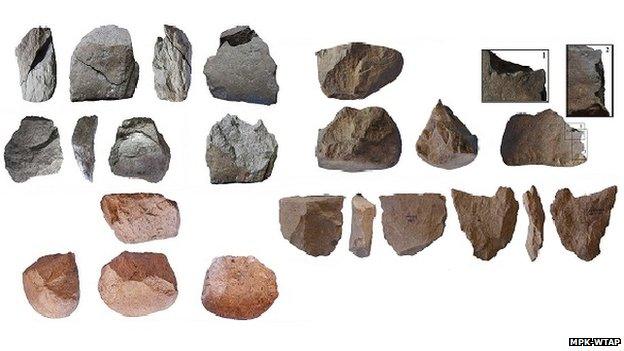Oldest stone tools pre-date earliest humans (original) (raw)
 Image source, MPK-WTAP
Image source, MPK-WTAP
Image caption,
The tools includes sharp-edged flakes, hammers and anvils
The world's oldest stone tools, external have been discovered, scientists report.
They were unearthed from the shores of Lake Turkana in Kenya, and date to 3.3 million years ago.
They are 700,000 years older than any tools found before, even pre-dating the earliest humans in the Homo genus.
The find, reported in Nature, external, suggests that more ancient species, such as Australopithecus afarensis or Kenyanthropus platyops, may have been more sophisticated than was thought.
"They are significantly earlier than anything that has been found previously," said Dr Nick Taylor, from the National Centre of Scientific Research (CNRS) in France and the University of Leiden in the Netherlands.
"It's really quite astonishing to think what separates the previous oldest site and this site is 700,000 years of time. It's monumental."
Image source, MPK-WTAP
Image caption,
This stone tool is known as a core - flakes, used for cutting, are sheared away from its edges
The first tools from the site, which is called Lomekwi 3, were discovered in 2011. They were spotted after researchers took a wrong turn as they walked through the hot, dry Kenyan landscape.
By the end of 2012, a total of 149 tools had been found, and another field trip in 2014 has unearthed more still.
They include sharp flakes of stone, sheared off from larger rocks, which were most likely used for cutting.
Hammers and anvils were also excavated, some of which were huge in size.
"The very largest one we have weighs 15kg, which is massive," Dr Taylor told BBC News.
"On this piece, it doesn't show the signs of actually having been flaked to produce other artefacts... rather, it was probably used as an anvil.
"It probably rested in the soil and the other cobbles brought to the site, which were intended to be smashed apart to make tools, were struck against this large anvil."
Image source, MPK-WTAP
Image caption,
The tools were found near to Lake Turkana in northern Kenya
Dating of the volcanic ash and minerals around the tools suggests that they are 3.3 million years old.
Until this discovery, the oldest examples of this technology were the Oldowan tools from Tanzania, which date to about 2.6 million years ago.
The researchers say the 700,000-year time difference reveals how manufacturing methods and use changed over time, growing more advanced.
Image source, Science Photo Library
Image caption,
Before this discovery, Homo habilis was thought to be the first species to use stone tools
The scientists do not know who made the tools discovered in Kenya.
Until now, some thought that Homo habilis - known as "handy man" - was the earliest of our ancestors in the Homo genus to use tools.
But with Homo fossils dating back to only 2.4-2.3 million years ago, it now seems unlikely that this was the first toolmaker.
Other finds, such as animal bones found in Ethiopia with cut marks that date to 3.39 million years ago, also suggest tool use began before H. habilis.
Scientists now believe the 3.3-million-year-old implements were crafted by another, more primitive species.
Dr Taylor said: "There are a number of possible candidates at present.
"There was a hominin called Kenyanthropus platyops, which has been found very close to where the Lomekwi 3 tools are being excavated. And that hominin was around at the time the tools were being made.
"More widely in the East African region there is another hominin, Australopithecus afarensis, which is famously known from the fossil Lucy, which is another candidate."
Image source, Science Photo Library
Image caption,
Australopithecus afarensis is a primitive species with both human and ape-like features
Neither of these species was assumed to be particularly intelligent - they had both human and ape-like features, with relatively small brains.
However the tools suggest they may have been smarter than assumed.
Dr Ignacio de la Torre, from University College London's Institute of Archaeology, described this as "a game-changing" find.
"It's the most important discovery in the last 50 years," he told BBC News.
"It suggests that species like Australopithecus might have been intelligent enough to make stone tools - that they had the cognitive and manipulative abilities to carry tasks like this out."
Follow Rebecca on Twitter, external
Related internet links
The BBC is not responsible for the content of external sites.